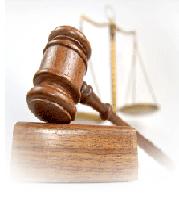Democrats on trial
What happens if Thailand's Democrats are found guilty?
 Thailand's ruling Democrat Party, the country's oldest, is facing possible dissolution and political bans for up to 31 of its executives if it is found guilty of misusing state funds.
Thailand's ruling Democrat Party, the country's oldest, is facing possible dissolution and political bans for up to 31 of its executives if it is found guilty of misusing state funds.
The Constitutional Court heard final arguments on Monday in the case against the Democrats, which could see the removal of Prime Minister Abhisit Vejjajiva. The verdict will be read out from 2 a.m. ET. Analysts believe dissolution is unlikely.
Why are the democrats on trial?
Prosecutors say the party misused a 29 million baht ($972,000) grant from the Election Commission ahead of the 2005 general election. It might seem trivial: the Democrats were supposed to spend the money on big advertising boards but opted for smaller signs, which the prosecution contends is a breach of election laws.
The defense said the party did not misuse the grant and its actions complied with a 1998 law. It said any punishment should be related to that law, which had no provision to dissolve a party or ban executives and simply punished individuals responsible; a 2007 amendment brought in the penalties of party dissolution and bans on executives.
What happens if the party is dissolved?
As many as 31 executives could be banned for five years, although the only high-profile casualty in the current administration would be the charismatic, Oxford-educated Abhisit, who was a deputy party leader at the time.
Under this scenario, the rest of the party's lawmakers would probably form a new party, or switch to another they may have already registered in anticipation of such a verdict. A caretaker premier would then be chosen to fill the void and the new Democrat incarnation would probably put forward a candidate of its own to take the job after a parliamentary vote.
However, if some executives are banned, the parliamentary clout of the new Democrat party could be weakened.
Another option the Democrats could pursue would be to back a non-Democrat coalition figure they could work with as premier, such as veteran Deputy Prime Minister Sanan Kachornprasart, an adviser to the Chart Thai Pattana Party, while keeping their lead role in the coalition.
Could the party be found guilty but avoid dissolution?
Yes. The court might allow the Democrats to remain a party and simply punish those involved directly, as prescribed by the 1998 party law. The court might also absolve Abhisit of any blame. Party lawyers say Abhisit signed a budget document when he became party leader, after the alleged irregularities took place.
The only real setback then would be the loss of some parliamentarians, but again, the party could strike deals with smaller parties to ensure it remained in control.
Could there be a backlash to such an outcome?
If Abhisit and his party are cleared altogether, or found guilty but remain in office, the opposition Puea Thai Party and its allies in the "red shirt" protest movement would be outraged.
Failure to dissolve the party and ban Abhisit would lead to more complaints about judicial "double standards" and allegations of interference in the courts by generals and the establishment. Renewed street protests cannot be ruled out.
One of Puea Thai's previous incarnations, Thai Rak Thai, the only party to enjoy two landslide election wins, was dissolved in 2007 and had 111 executives banned for five years under a temporary post-coup constitution drafted by the military.
Puea Thai and the red shirts could argue that if the court refers to the 1998 party law in the case of the Democrats, which saves them from political bans and dissolution, that legislation should also have applied to Thai Rak Thai.
Could the court's decision affect stability?
Even if the party is dissolved and Abhisit is banned, the Democrats, inside a new party, would probably remain the biggest coalition force. One of its heavyweights would probably become prime minister, with the backing of the establishment and army.
However, their weight in the alliance might be weakened, which could add to signs of disunity that Puea Thai would seek to exploit, factors that could delay policy decisions.
The worst-case scenario would be an outcry from the red shirts and a resumption of protests that carry the potential for political paralysis, violence and even military action, which could hurt the stock market and economic growth.
What about the internet video clips?
The case has been tainted by the release of video clips on the Internet appearing to show discussions about it between a Democrat official and a court secretary and judges while the proceedings were in progress. Puea Thai has cried foul.
But the authorities are going after the court secretary, who has fled the country, and those responsible for uploading the clips, rather than investigating the judges and Democrat official caught on camera. The judges have denied any wrongdoing.
(Published by Reuters - November 29, 2010)